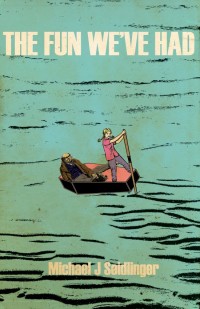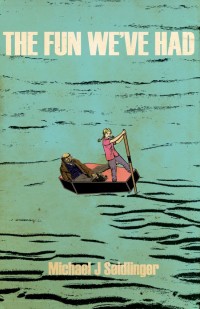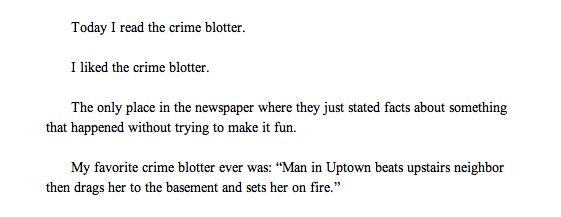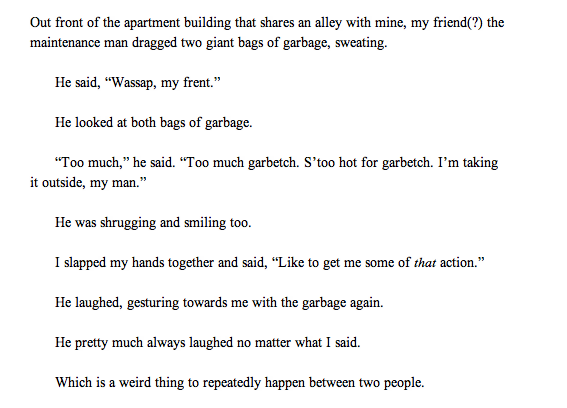25 Points: Mother of a Machine Gun
 |
Mother of a Machine Gun
by Michael J. Seidlinger
Lazy Fascist Press, 2014
100 pages / $7.95 buy from Amazon
|
1. When I first read the title, I pondered the possibility of an automatic weapon being successfully birthed from a woman’s vagina. (Pretty sure your genitalia would never be the same.)
2. The writing style of Mother of a Machine Gun reminded me of some strange Dr. Seuss book I read as a child.
3. Michael J. Seidlinger is a fucked up Dr. Seuss.
4. Kind of wonder if Seidlinger’s mother has read Mother of a Machine Gun and whether or not she thought it should be “critically acclaimed.”
5. Pondered the economic and environmental costs of having so many one-line paragraphs.
6. To go along with point #5, probably should’ve put in pictures or something to fill in the vast amount of white space.
7. To go along with points #5 and #6, the vast amount of white space and one-line paragraphs make for a quick read. (Could be a positive or negative thing depending on whether or not you like the book.)
8. Mother of a Machine Gun is a story of denial.
9. Mother sucks at being a mother.
10. Mother probably shouldn’t be left to go on a crusade to find her son.
September 25th, 2014 / 4:30 pm
40 Points: Witch Piss
 |
Witch Piss
by Sam Pink
Lazy Fascist Press, 2014
112 pages / $8.95 buy from Amazon
|
1. Lot of 40s get drunk in Witch Piss.
2. So, take a pull.
3. King Cobras to be specific.
4. King Cobras are dirt cheap at just $1.99.
5. It’s hard to get an idea of the narrator.
6. Early on, he decides to be a ‘yes man.’
7. “I decided then to only ever encourage people, no matter what they wanted to do. To get through life by saying yes to everything, so no one could say I didn’t get what I wanted, and also so nobody would dislike me.”
8. Most everything he says is deflective in this way.
9. The reader does, I think, get a glimpse of the narrator when he shares his thoughts every now and then.
10. “Imagining myself enlarged, inhaling the smoke off a burning cop as he scream ‘no no no’ – unable to even touch his agonizing face because his skin’s so blistered.”
September 18th, 2014 / 5:18 pm
25 Points: Go to Work and Do Your Job. Care for Your Children. Pay Your Bills. Obey the Law. Buy Products.
 |
Go to Work and Do Your Job. Care for Your Children. Pay Your Bills. Obey the Law. Buy Products.
by Noah Cicero
Lazy Fascist Press, 2013
188 pages / $12.95 buy from Amazon
|
1. Still one of the best titles of any novel, ever.
2. This book is in two parts. Part 1 is narrated by a reasonably bland, vaguely liberal character named Michael who starts a job at a ‘treatment centre’ (for treatment centre read prison) complex called NEOTAP. Part 2 is narrated by NEOTAP IT employee, work colleague and soon to be girlfriend Monica.
3. The whole thing is a mish-mash of different genres, different registers, narrative structures, etc., and is largely concerned with the kind of Orwellian power of the NEOTAP system.
4. The NEOTAP system is, roughly speaking, an analogy for American (Global?) Capitalism and its ‘5 pillars’ (the five pillars of the book’s title). I was pleased that it was only a lightly fictionalised dystopia as there is little need to overly fictionalise something that very much seems to me to be the dystopia of contemporary western capitalist reality.
5. I’m pleased young Alt-Lit people/novelists are engaging with these kinds of things. It gives the lie to any notion that Alt-Lit is merely just a narcissistic pose (it is sometimes) but clearly there are more possibilities for it and this should be embraced.
6. With this in mind, I’m going to suggest this book is a great starting point towards reading more about how the advanced capitalist system works. You know how they like to say marijuana is a kind of gateway drug to other ‘terrible’ drugs, well this book is a gateway drug to the following (see points 7-11).
7. Read this book then read Orwell’s 1984 (which is a bit out of date actually and can sometimes become a kind of carnivalesque pressure valve type situation that posits a clichéd ‘Orwellian’ dystopia that can be re-co-opted by a strand of the entertainment industry who make it so cartoonish that it somehow becomes part of the horror genre and risks missing out on the original points that Orwell was trying to make. The general principles remain sound though).
8. Kafka’s The Trial (similar situation to point 7).
9. Some basic Marxism (you might think this is ‘old’ but a lot of it is more important than ever).
10. Current articles about how ‘The Internet of Things’ will benefit insurance companies and socially engineer us more than we ever imagined.
August 14th, 2014 / 2:30 pm
25 Points: The Fun We’ve Had
 |
The Fun We’ve Had
by Michael J. Seidlinger
Lazy Fascist Press, 2014
168 pages / $11.95 buy from Amazon
|
1. I want the cover of this book framed and hung up in my room.
2. Recognized and accepted that this novel was going to end in tragedy from the beginning.
3. They either brought a really shitty oar on this terrifying adventure, or that guy doesn’t know how to paddle. (It breaks within the first few pages.)
4. Life lesson from this novel: coffins don’t make good boats. (No shit.)
5. Imagined this book as one of the little “skits” in the film Heavy Metal with “Fade to Black” by Metallic playing in the background.
6. After realizing that Seidlinger was using the five stages of grief as a plot device, I immediately thought of a Robot Chicken skit where a giraffe gets stuck in a sand pit.
7. The Fun We’ve Had is an extreme form of marital counseling.
8. How the hell did these people get into this situation? (This can be taken as both a literal and metaphorical question.)
9. I want to know what ocean these people are sailing through—and don’t tell me it’s the “sea of life” because that’s bullshit and you know it.
10. Seidlinger doesn’t believe in long paragraphs. He wants to jab you with short one-liners that make you question everything.
July 1st, 2014 / 12:00 pm
The Fun We’ve Had
 |
The Fun We’ve Had
by Michael J. Seidlinger
Lazy Fascist Press, 2014
168 pages / $11.95 buy from Amazon
Rating: 7.9
|
How do you write a thrilling and entrancing Alt Lit novel?
Start with a chorus of disembodied voices telling us that “the waves are helloes; the incoming storm the sincerest goodbye. Like every single one of us, they are holding on. We held on until we could no longer hide. No one can hide out at sea.”
June 24th, 2014 / 12:00 pm
In Theory, This Could Be Fun
Airport living from 5/14 thru 5/16 in celebration/mourning of the publication of my latest book, “The Fun We’ve Had.”
Any advice on keeping off of security’s radar? Anyone want a shout-out when I get really fucking bored? Anyone want to Skype while I’m leeching off the airport’s Wi-Fi?
Maybe I’ll just watch that Tom Hanks movie and do exactly what he did. Could be good.
Here’s the blog post I wrote about this, whatever this is:
In a big way, being in an airport is a lot like being lost at sea. So many places and possibilities to drift, but not if you don’t already know where it is that you’re going.
I don’t know where I’m going. That’s why I’m not going anywhere.
I’ll be living in an airport for 48hrs.
Beginning 10AM on Wednesday May 14th through Friday May 16th around 10AM: Going nowhere and probably getting into some shit. There’s a good chance I will no longer be human by the end of it. There’s a pretty damn good chance that I’ve never been human. Not to worry, I’ll be online and active during the entire thing.
Odds are you’ll hear from me, be it a tweet, a post on Facebook, or a photo/video on Instagram. I’ll be calling out to everyone while I’m stranded in a state of flux. I’ll also have one of my best writer friends around, Kyle Muntz, hanging around, surviving this ridiculousness with me.
Yes I’m serious. Look how serious I am:
Will it be fun? I hope so. If not, I’ll be at the airport bar.
\m/ \m/
Witch Piss
 Witch Piss
Witch Piss
by Sam Pink
Lazy Fascist Press, 2014
112 pages / $8.95 buy from Amazon
Rating: 7.0
Witch Piss is the bottom of a forty oz.
Witch Piss is a novel.
Witch Piss is published by Lazy Fascist Press.
Witch Piss is Sam Pink writing about a Sam Pink-like narrator.
Witch Piss is homeless men.
Witch Piss is “Y’gah be kiddin me.”
Witch Piss is a slurry of language.
Witch Piss is written in dialect.
Witch Piss is a man named Spider-Man.
Witch Piss is a girl named Janet in a dirty Depends.
March 25th, 2014 / 12:00 pm
GO TO WORK AND DO YOUR JOB. CARE FOR YOUR CHILDREN. PAY YOUR BILLS. OBEY THE LAW. BUY PRODUCTS.
 GO TO WORK AND DO YOUR JOB. CARE FOR YOUR CHILDREN. PAY YOUR BILLS. OBEY THE LAW. BUY PRODUCTS.
GO TO WORK AND DO YOUR JOB. CARE FOR YOUR CHILDREN. PAY YOUR BILLS. OBEY THE LAW. BUY PRODUCTS.
by Noah Cicero
Lazy Fascist Press, 2013
188 pages / $12.95 Buy from Amazon
Noah Cicero wrote a new book in 2013.
It’s called GO TO WORK AND DO YOUR JOB. CARE FOR YOUR CHILDREN. PAY YOUR BILLS. OBEY THE LAW. BUY PRODUCTS.
But I’m going to call it GO TO WORK.
GO TO WORK is a political thriller about a man who gets a job at a prison-treatment-center called NEOTAP (you never find out what this means btw) and, pretty much, wow—after that, things start to get crazy.
It’s like: WAITING FOR GODOT meets the second season of the television series LOST meets DAVID LYNCH meets BLAIR WITCH PROJECT meets the book 1984 meets IT’S ALWAYS SUNNY IN PHILADELPHIA meets the movie CUBE meets BRAVE NEW WORLD meets SVU meets ARCHER meets the book ANTHEM meets FIREFLY meets the play NO EXIT by Jean-Paul Sartre meets THE TRIAL by Franz Kafka meets the movie WHITE LIGHTNING meets the book THE POSSESSED meets LOCK UP.
There are two main characters: Michael Scipio and Monica Whitten.
The book is told in the first-person and third-person past tense in two parts: Part One and Part Two.
Part One is Michael. First person.
“I was nervous. I was wearing a nice pair of slacks and a button-down, long-sleeved dress shirt with a tie. The tie looked great. I looked great. Everything seemed wonderful. I was a man interviewing to get a job working for the government, but I was nervous.”
Also.
“I called my parents and told them I got the job. They were excited for me. They told me to come over and they could get pizza and cake. My parents were very big into positive reinforcement. When I scored my first goal in soccer when I was seven, they bought me pizza and cake. When I was in the eighth grade talent show, playing guitar very badly, they bought me pizza and cake. When I got straight A’s on my report card, I was for sure going to get pizza and cake. Pizza and cake are the ways Americans celebrate triumphs.”
Then Part Two. Monica. Third person.
“Monica walked into NEOTAP. She went into the office and said hi to Lawrence and Imad. She didn’t know Imad and Lawrence like Mike did. She didn’t have to interact with them on a power basis. She would say hi to everyone, have small talk about sports, computers, or random life things. Everyone knew that Monica loved Arby’s and would eat Arby’s at least three times a week. Sometimes people called her Arby’s girl.”
And.
“Monica considered herself a troubleshooter. Her life was about fixing problems. Her dad had taught her the joy of solving problems. When something broke, they fixed it together. When the care broke, they fixed it together. When the roof leaked, they fixed it together. When the water heater needed to be replaced, they took it out and replaced it together.”
Semi-spoiler alert: After Part One, Michael goes missing—disappears—and Monica becomes the main character because she decides she needs to find out what happened to Michael.
Kind of interesting.
The book is set in 2011 and it’s about what it means—what it’s like—to live in the real world. In America. The United States. Right now. It’s about being young. About needing to find a job. About finding that job. About needing that job so you can have access to healthcare. About falling in love. About betrayal. About deception. Needing healthcare. About following orders. About forgetting what you’re supposed to be doing sometimes. About feeling like you need healthcare real bad. About wondering if what you are doing is the right thing. About meeting people’s parents for the first time. Healthcare. About doing something crazy because maybe you think you are in love. About taking prescription drugs because they make you feel good. H-E-A-L-T-H-C-A-R-E. And about disappearing too.
It’s a lot about disappearing.
In the chapter ‘Under a Bed,’ a NEOTAP resident, who is Mexican, disappears, and no one seems to care.
“I went to Imad’s office and closed the door. I said to Imad, ‘Armando disappeared.’
Imad looked at me. He didn’t have a facial expression. He listened like I was explaining something that didn’t matter to him.
Finally, he said, ‘Okay, I’ll fix it.’
I left the office. Armando disappeared and no one cared. I saw Imad leave his office and walk to Heidelberg’s office. No one rushed around. Everyone moved without purpose, without a sense of urgency. A human had disappeared and no one cared. What kind of job did I have?”
GO TO WORK is a departure, basically, from everything [else] Noah Cicero out there. It’s got, like, a plot. And two main characters.
Remember: this is a political thriller by a guy who is known for writing alt lit!
There are so many beautiful characters and so many different layers to everything and so many cool things that happen; and so much super-philosophical stuff about life—it’s everything you love and know about Noah Cicero and the way he writes.
But GO TO WORK is also a very scary book. Or, I guess, if you want to look at it as something that can be scary—it’s scary. Noah Cicero discusses several important real-world issues. He looks at how things right now have changed from how they were in the recent past (and the ancient past). How things right now are probably going to become very bad very soon. How things are probably not going in the right direction for the world and the environment and the people in the world. How there are some people, right now, out there in the world, who are willing to do whatever it takes, basically, to change the world. And others, who want to keep the world the way it is, no matter what, at any cost. Noah Cicero also looks at how sometimes, where you work, you may not like where you work. How sometimes, you really don’t know what’s going to happen in the end. And how really, the world is just a scary place to be.
All these themes are pretty much classic Noah Cicero.
On Facebook, Noah Cicero said it might take 6 hours to read GO TO WORK. I agree. GO TO WORK—you could read all in one sitting. And everything is written in that very-easy-to-follow Noah Cicero prose.
“Criminal Thought #1. I want to get a woman pregnant. I will find the fattest stupidest woman I can find. I don’t care what race she is, probably white. If you have been to prison, fat white girls are easy. All you gotta do is show them some prison tats and a fat white trash girl will fuck you. I will get the nastiest woman I can find. A woman I know for sure will not be responsible for the child. She won’t even talk to the child, she won’t even take the child to the park… she will scam the government out of every dollar she can… I won’t pay child support. I will do lots of drugs and never see my kid. It will be really funny.”
January 10th, 2014 / 10:00 am
Basal Ganglia by Matthew Revert
 Basal Ganglia
Basal Ganglia
by Matthew Revert
Lazy Fascist Press, Oct 2013
120 pages / $9.95 Buy from Amazon
On the evening of July 25, 1965, Bob Dylan strapped on a Fender Stratocaster and gave the audience at the Newport Folk Festival an electric rendition of “Maggie’s Farm.” The switch was received with a cacophonous chorus of boos and hisses. Dylan had gone electric, but the audience wasn’t ready. Almost fifty years later, author Matthew Revert is doing something akin to that with his latest novel, Basal Ganglia. One of the best absurdists in contemporary fiction, Revert has built a cult following based on his previous works, all of which have used humor as the cohesive element that keeps his mixture of bizarro, surrealism, and literary fiction together. In Basal Ganglia, the hilarity has been replaced with it’s exact opposite, but the sheer beauty and elegance of the final product is much more gratifying than any of the author’s previous efforts.
Rollo and Ingrid met when they were teenagers and escaped the cruel, abusive world they’d known by moving into an underground fort made from pillows and blankets that mirrors the structure of the human brain. The lovers spent 25 years building the fort and subsequently became slaves to it. The narrative begins years after the fort is finished and Rollo and Ingrid live only to maintain it. They lead an isolated existence in which words have almost disappeared, communication is practically nonexistent, their past has been forgotten, and their love has morphed into silent tolerance. To bring them out of this situation, Ingrid decides they should have a baby. However, afraid of what another person would do to their dynamic and way of life, she opts to build one from the same materials they use to maintain the fort instead of having one the traditional way. When the baby’s done, instead of bringing them together, it makes them paranoid and each believes the other will hurt the child. What follows is a strange and heartbreaking psychological war in which Ingrid and Rollo will be forced to realize how their seclusion has changed them and how important the past is when trying to regain their individual and communal identities.
Basal Ganglia is not an easy read. Revert has a way of stuffing his prose with meaning, but the nature of that meaning changes constantly. He loves language, but expresses it by deconstructing it and putting it back together in ways that change the original meaning and create new ones:
On the surface, this novel deals with universal themes like lost love, faulty communication skills, identity, parenthood, fear, distrust, and isolation. However, there are a plethora of underlying elements that make it unique and give it depth. For example, Rollo and Ingrid’s relationship is exceptional because it’s hermetically sealed from the rest of the world. When they feel lonely or scared, the emotion is augmented by their self-imposed confinement. The outside world was mean to them, but hiding in the fort eventually made them victims of their reclusiveness. Also, Ingrid and Rollo are trapped in a perennial state of agitated stasis, and it only gets worse whenever they try to figure a way out of it. Their stagnation is never a calm one, but their growing awareness of the situation and perceived powerlessness turns it into a maelstrom that affects their sanity.
Revert has a knack for storytelling, but what makes this one an outstanding novel is the stylish, smart prose. The microcosm Ingrid and Rollo in habit is exclusive, but the author takes their circumstances as a way of exploring collective truths:
The truth is often sad, and that’s exactly what it is in Basal Ganglia. Neglect, worry, and solitude all lead to a razor-sharp sadness that cuts to the reader’s core throughout the narrative and keeps cutting after the story’s over. Sure, Ingrid and Rollo survive an imaginary loss, a confusing revelation, and find a way to move forward even with the understanding that the cyclic nature of most things is inevitable, but those silver linings arrive after Revert has fully exposed the bleakest corners of the human condition. The characters are forced to find a reason to reconnect with themselves and with each other, and the reader is there for every step of that psychological/emotional journey.
Basal Ganglia offers an immersive and very satisfying reading experience. The novel’s merits lie as much in the secluded universe Rollo and Ingrid inhabit as in the author’s beautiful use/celebration of language. By abandoning non-stop weirdness and hilarity, Revert has taken a giant step in a different direction, and the outcome is cause for celebration. I really hope he keeps walking that way.
***
Gabino Iglesias is a writer, journalist, and book reviewer living in Austin, TX. He’s the author of Gutmouth (Eraserhead Press) and a few other things no one will ever read. His work has appeared in The New York Times, Verbicide, The Magazine of Bizarro Fiction, Z Magazine, Out of the Gutter, Word Riot, The Rumpus, and a other print and online venues. You can reach him at gabinoiglesias@gmail.com.
November 18th, 2013 / 12:00 pm
I still work, motherfucker–New Sam Pink!
Electric Literature’s Recommended Reading this week is an excerpt from Sam Pink‘s forthcoming novel, Rontel, which is coming Valentine’s Day 2013 in print form from Lazy Fascist Press (kudos to Cameron Pierce!), as well as in a digital edition via Electric Literature. EL has also posted an animation of one of the sentences:
I found the excerpt hilarious and enjoyable and good. Sam is one of my favorite authors. I assume a lot of people who come to this site already love Sam Pink or suck, but if you don’t know him, he is a very clever author, darkly comic with some other thing going on.
Some excerpts from the excerpt:
And also:
Viva Sam Pink!




